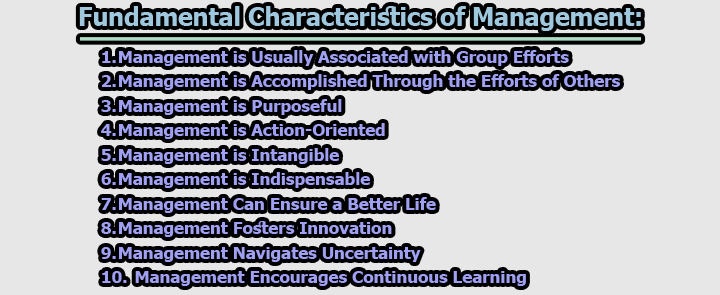Fundamental Characteristics of Management:
In the ever-evolving landscape of businesses and societies, one concept stands as a linchpin that holds together the myriad threads of progress – management. Management is more than a term; it’s a dynamic process that orchestrates the allocation of resources, directs the efforts of individuals, and guides organizations toward their goals. In this article, we will explore the fundamental characteristics of management.
1. Management is Usually Associated with Group Efforts: At the heart of management lies the fundamental truth that it is inherently linked with group efforts. Regardless of the domain – be it a multinational corporation, a non-profit organization, or a community project – management thrives when it harnesses the collective power of individuals working towards common objectives. Through the harmonization of diverse talents, skills, and roles, effective management fosters collaboration, synergy, and the attainment of shared goals. The coordination of these multifaceted inputs into a unified whole is a testament to the art of management, which transcends individual contributions and paves the way for collective success.
2. Management is Accomplished Through the Efforts of Others: The essence of management is encapsulated in its reliance on the efforts of others. Managers, often positioned as leaders of teams or entire organizations, bear the responsibility of guiding, directing, and motivating their subordinates. This intricate relationship hinges on the art of effective communication, adept delegation, and empowering leadership. Accomplished managers possess the unique ability to harness the strengths of their team members, aligning individual aspirations with the overarching mission of the organization. In this way, management becomes a collaborative dance that blurs the lines between hierarchy and cooperation, as managers facilitate the growth and contributions of their team members.
3. Management is Purposeful: Purpose is the North Star that guides managerial decisions and actions. The core of effective management is rooted in setting clear objectives and crafting strategies to achieve them. Every action taken within a management context is imbued with purpose, directed towards the achievement of predetermined goals. This purpose-driven approach not only provides a sense of direction but also serves as a touchstone for evaluating progress. The meticulous alignment of actions with objectives ensures that every effort contributes meaningfully to the larger narrative of organizational success.
4. Management is Action-Oriented: While planning is pivotal, it is the execution of those plans that set management apart. Management is characterized by its unwavering commitment to translating strategies into tangible outcomes through concrete actions. This action-oriented approach bridges the gap between vision and reality, between intention and achievement. Effective managers are those who possess the acumen to translate theoretical concepts into practical results, breathing life into strategies and catalyzing progress.
5. Management is Intangible: While the effects of effective management manifest tangibly in increased productivity, optimized efficiency, and enhanced profitability, the process itself remains intangible. Unlike tangible resources that can be seen and touched, management operates within the realm of ideas, strategies, and relationships. Its impact reverberates throughout the organization, shaping the attitudes, behaviors, and interactions of individuals. This intangibility underscores the pivotal role of managerial skills in shaping organizational dynamics, where invisible forces mold visible outcomes.
6. Management is Indispensable: The concept of management attains an irreplaceable stature when its absence is contemplated. Organizations, whether they are large corporations or small community initiatives, rely on the guidance and structure that management provides. Without effective management, endeavors descend into disarray; resources remain untapped, efforts are disconnected, and goals recede into the realm of the unattainable. The indispensability of management is a testament to its role as a fundamental pillar of sustainable success.
7. Management Can Ensure a Better Life: Beyond its association with organizational endeavors, the principles of management extend their influence into the realm of individual lives. The art of management encompasses goal-setting, prioritization, time management, and effective decision-making. By applying these principles to daily life, individuals can streamline their actions, allocate resources efficiently, and derive a heightened sense of purpose and accomplishment. Consequently, the benefits of management transcend the confines of the corporate world, permeating the lives of individuals and contributing to their holistic well-being.
8. Management Fosters Innovation: Innovation flourishes in environments where management practices are conducive to creativity and exploration. Effective managers cultivate spaces where diverse ideas are embraced, experimentation is encouraged, and calculated risks are viewed as stepping stones to progress. By nurturing innovation, management empowers organizations to adapt to evolving landscapes, outpace competitors, and remain dynamic in an ever-changing world. The marriage of management and innovation propels organizations beyond their comfort zones, ushering in new paradigms and redefining possibilities.
9. Management Navigates Uncertainty: The hallmark of adept management is its capacity to navigate the uncharted waters of uncertainty. In a world marked by volatility, effective management acts as a compass that steers organizations toward stability and growth. Through strategic planning, thorough risk assessment, and proactive decision-making, managers guide their teams with resilience and determination. This ability to navigate uncertainty showcases the adaptability and foresight that management brings to the forefront, reinforcing its role as a stabilizing force amid the unpredictable tides of change.
10. Management Encourages Continuous Learning: A culture of continuous learning stands as a testament to the spirit of effective management. Managers recognize the imperative of staying informed about industry trends, emerging technologies, and evolving best practices. By fostering an environment that values ongoing learning, managers inspire their teams to develop new skills, expand their knowledge, and remain agile in a swiftly evolving landscape. The synergy between management and continuous learning perpetuates a cycle of growth, where organizations and individuals evolve in tandem with the dynamic world around them.
In the symphony of progress, management emerges as the conductor that orchestrates the harmonious interplay of people, resources, and strategies. Its fundamental characteristics, including its alignment with group efforts, reliance on the efforts of others, purpose-driven nature, action-oriented approach, and intangible influence, underscore its vital role in shaping the trajectory of organizations and societies. Moreover, its indispensability, potential to enhance the quality of life, capacity to foster innovation, adeptness in navigating uncertainty, and emphasis on continuous learning reaffirm its transformative impact across diverse domains. As we navigate the intricate tapestry of modern existence, the principles of management will continue to serve as a guiding light, illuminating the path toward efficiency, effectiveness, and holistic progress.
Frequently Asked Questions [FAQs]:
What is management, and why is it important?
Management refers to the process of planning, organizing, directing, and controlling resources, people, and activities within an organization to achieve specific goals. It plays a pivotal role in ensuring the efficient utilization of resources, enhancing productivity, and guiding organizations toward success. Without effective management, organizations would lack direction, coordination, and the ability to navigate challenges.
How is management associated with group efforts?
Management is closely linked with group efforts as it involves coordinating the contributions of individuals toward achieving common goals. It brings together diverse talents, skills, and perspectives to create a collaborative environment where everyone works towards shared objectives. Effective management fosters teamwork, synergy, and the pooling of collective strengths to drive success.
Can you elaborate on the purposefulness of management?
Management is purpose-driven, with every action and decision aligned toward specific goals. Clear objectives provide a roadmap for managers to formulate strategies, allocate resources, and guide their teams. Purposefulness ensures that efforts are directed toward meaningful outcomes, and it also facilitates the evaluation of progress and success.
How does management encourage innovation?
Effective management creates an environment conducive to innovation by encouraging creativity, experimentation, and idea-sharing. Managers who embrace diverse perspectives and tolerate calculated risks empower their teams to think outside the box. This approach fosters a culture where innovation thrives, enabling organizations to adapt, evolve, and stay competitive.
Why is management considered indispensable?
Management is indispensable because it provides structure, direction, and order within organizations. It facilitates the efficient allocation of resources, empowers individuals, and ensures that efforts are coordinated toward common goals. Without management, chaos would ensue, leading to wastage of resources, disjointed efforts, and ultimately, failure to achieve objectives.
How does management navigate uncertainty?
Effective management addresses uncertainty through strategic planning, risk assessment, and proactive decision-making. Managers anticipate potential challenges and devise contingency plans to mitigate risks. Their ability to adapt quickly to changing circumstances ensures organizational resilience and the ability to navigate through uncertain times.
How does management impact personal life?
The principles of management extend beyond organizations and can improve personal effectiveness. Techniques such as goal-setting, time management, and prioritization can be applied to daily life, leading to better organization, increased productivity, and enhanced overall well-being.
What are the intangible aspects of management?
Management operates primarily in the realm of ideas, strategies, and relationships, making its impact intangible. While the outcomes of effective management, such as improved performance, are tangible, the process itself involves orchestrating intangible elements like communication, motivation, and coordination.
How does management encourage continuous learning?
Effective managers foster a culture of continuous learning by valuing ongoing development, encouraging skill enhancement, and staying updated on industry trends. This approach inspires team members to expand their knowledge and skills, enhancing their individual growth and the overall competitiveness of the organization.
Can management ensure a better life beyond organizations?
Absolutely. Management principles like goal-setting, time management, and effective communication are applicable to personal life. By integrating these principles, individuals can enhance their personal productivity, achieve life goals, and maintain a balanced lifestyle.
What sets management apart as an action-oriented process?
Unlike mere planning or conceptualization, management emphasizes the execution of strategies through practical actions. Managers translate ideas into tangible outcomes, ensuring that plans are put into motion and progress is achieved. This action-oriented approach bridges the gap between intent and achievement.
How do managers accomplish tasks through the efforts of others?
Managers rely on their leadership skills to guide and empower their team members. They delegate responsibilities based on individual strengths, motivate their teams, and provide the necessary resources and support for tasks to be successfully completed. This collective effort under skilled management ensures efficient task accomplishment.

Library Lecturer at Nurul Amin Degree College










